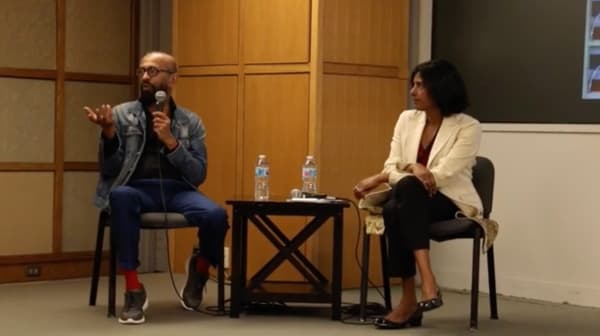APRIL WORKS: BACKPACKS, BOMBS & BORDERS: Jagath Weerasinghe
In this series, created between April/May 2019, Weerasinghe responds to the Easter Attacks that occurred in Sri Lanka. In Los Angeles during this time, Weerasinghe began a smaller series of work on paper and installation in response to news of the attacks, he later continued the series during his residency at Davidson College, North Carolina where he created works on butcher paper.
The artist draws parallels between mundane objects/materials and violence; an evolution of this form of narrative and hidden ironies are continuously present in his work. Using the self to narrate the political concepts in his works he writes love letters to emphasize the harsh reality behind the themes of violence, corruption, sexuality and borders.
The work or the series of works that I try to do here during my residency is about how borders, taken the concept in its widest sense, make the idea of the self to disintegrate, to fragment and to frustrate. But as we know the ‘self’ doesn’t really disintegrate or fragments as such. Said in other words, what I try to capture is the tyranny of the frustrating processes that borders engender.”- Jagath Weerasinghe
Saskia Fernando Gallery is pleased to present 'April Works: Backpacks, Bombs & Borders' by Jagath Weerasinghe. In this series, created in April 2019, Weerasinghe responds to the Easter Attacks that occurred in the same month in Sri Lanka. In Los Angeles during this time, Weerasinghe began a smaller series of work on paper and installation in response to news of the attacks, he later continued the series during his residency at Davidson College of Art, North Carolina where he created works on Butcher Paper. The artist draws parallels between mundane objects/materials and violence; an evolution of this form of narrative and hidden ironies are continuously present in his work. Using the self to narrate the political concepts in his works he writes love letters to emphasize the harsh reality behind the themes of violence, corruption, sexuality and borders.
In this series, Weerasinghe depicts the body in various states of fragmentation. Broken and incomplete, the bodies depict what may happen to each of us at a border crossing. “ Whether security checkpoints, border walls, or more abstractly, the moment we meet someone for the first time, or even when we fall in love.” Weerasinghe addresses borders as a site for deconstruction of identity to the point of abstraction, where “one’s perceived ability to present oneself is temporarily halted and suspended” and the sojourner acquiesces to the unknown and an invasion of privacy.
In the second work, Weerasinghe presents several backpacks- an object that carries basic or inane personal artefacts, yet is often searched when we attempt to enter different spaces. Whether crossing geopolitical borders or simply gaining entrance into a variety of controlled spaces such as government buildings to museums, backpacks are variously confiscated. Stored, carried, or protected. In the painting, the backpacks are black, huddled together, like stand-ins for the owners. We might imagine this group at the border, awaiting permission to cross into a new place. Weerasinghe places a clear backpack in the gallery as a reminder of new rules put in place at schools, stadiums, and other public locales due to the rise in mass shootings. As a symbol, a backpack is a catchall for travelers, scholars, and seekers. At borders, they are treated with an air of anxiety; loudspeakers warn travelers of the dangers of unaccompanied baggage.




